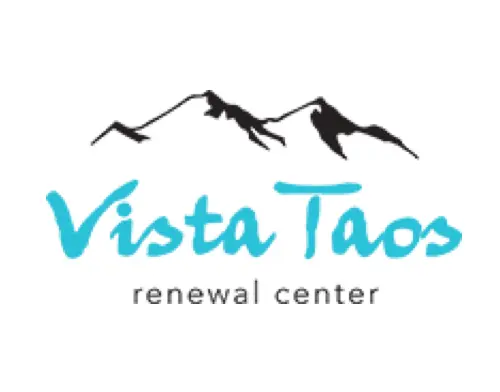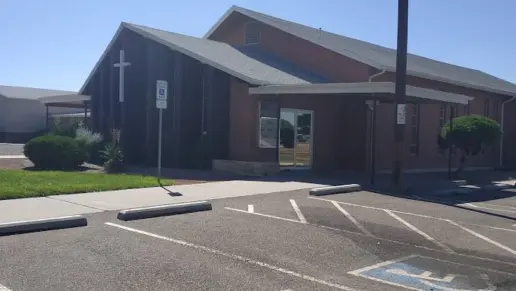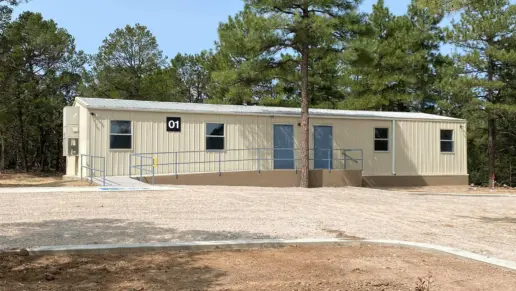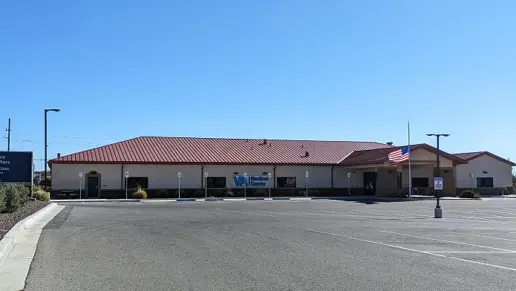About Vista Taos Drug & Alcohol Rehabilitation Center
Vista Taos Drug & Alcohol Rehabilitation Center is an addiction treatment facility. They're located in the majestic Sangre de Cristo mountains of El Prado, New Mexico. Adult men and women will find help here for substance use disorders. They offer comprehensive treatments that include medical detox, residential treatment, outpatient (OP), and sober living support.
Everything is customized to fit each individual. That includes the medical detoxification program. If you choose that path, you’ll spend 6-10 days in detox. Full time care and monitoring are handled under the supervision of their medical director and director of nursing. In addition to clinical care during detox, they offer holistic healing through nutrition, acupuncture, and massage therapy.
When you’re ready, you’ll move into residential treatment. Everything about treatment blends proven methods with holistic practices. Clients participate in individual and group therapy. They also attend 12 Step meetings. Two common therapies used here are cognitive behavioral therapy (CBT) and dialectical behavioral therapy (DBT). Complementary programs include meditation, yoga, and massage.
Grief and loss therapy is another piece of primary treatment. Addiction can cause people to experience tremendous loss. Recovery itself can trigger feelings of loss and grief. Learning how to process these complicated emotions can help prevent relapse. Speaking of relapse, you’ll learn mindfulness techniques as part of relapse prevention.
You’ll notice they refer to their programs as primary treatment and extended care. Once you finish treatment, you become a lifetime member of the alumni program. Taos has a vibrant recovery community. If you decide extended care is right for you, you’ll transition to either Casa Vida or Casa Feliz. The purpose of extended care is to help you go from residential treatment back to your normal environment.
Most clients pay for treatment through insurance. They contract with Blue Cross Blue Shield, UnitedHealthcare, Presbyterian Insurance of New Mexico, NM TrueHealth, and Cigna. Insurance providers outside of their network may still offer addiction treatment benefits. They also accept certified checks, credit cards, and wire transfers.
If you’re ready to heal your body, mind, and spirit, Vista Taos can be a good fit to start recovery.
Gallery
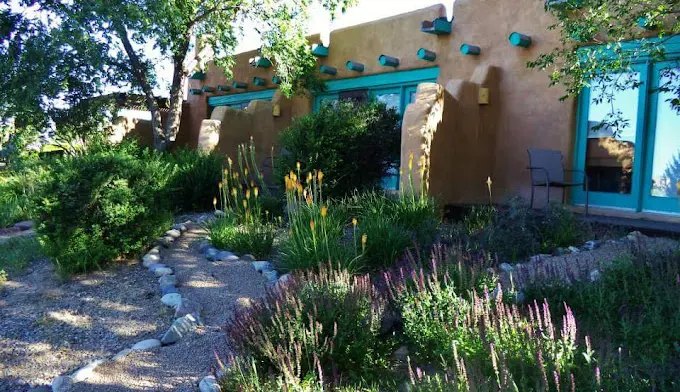
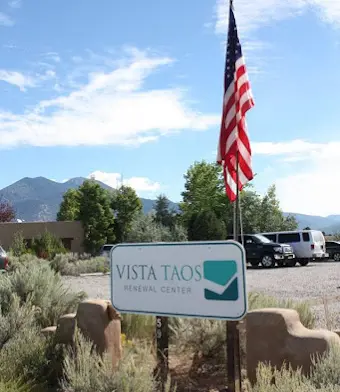
Location
Other Forms of Payment
Private insurance refers to any kind of healthcare coverage that isn't from the state or federal government. This includes individual and family plans offered by an employer or purchased from the Insurance Marketplace. Every plan will have different requirements and out of pocket costs so be sure to get the full details before you start treatment.
Self-pay involves paying for treatment out of your own pocket. You can use savings or credit, get a personal loan, or receive help from family and friends to fund your treatment. If you don't have insurance or your insurance plan doesn't cover a specific program, self-pay can help ensure you still get the care you need.
Addiction Treatments
Levels of Care
Treatments
The goal of treatment for alcoholism is abstinence. Those with poor social support, poor motivation, or psychiatric disorders tend to relapse within a few years of treatment. For these people, success is measured by longer periods of abstinence, reduced use of alcohol, better health, and improved social functioning. Recovery and Maintenance are usually based on 12 step programs and AA meetings.
Each drug rehab in New Mexico offers unique amenities and treatment methods. Common aspects of treatment include group and individual counseling, recreational therapy, medication management, and healthy living. Aftercare is often provided to prevent relapse.
Many of those suffering from addiction also suffer from mental or emotional illnesses like schizophrenia, bipolar disorder, depression, or anxiety disorders. Rehab and other substance abuse facilities treating those with a dual diagnosis or co-occurring disorder administer psychiatric treatment to address the person's mental health issue in addition to drug and alcohol rehabilitation.
A combined mental health and substance abuse rehab has the staff and resources available to handle individuals with both mental health and substance abuse issues. It can be challenging to determine where a specific symptom stems from (a mental health issue or an issue related to substance abuse), so mental health and substance abuse professionals are helpful in detangling symptoms and keeping treatment on track.
Opioid rehabs specialize in supporting those recovering from opioid addiction. They treat those suffering from addiction to illegal opioids like heroin, as well as prescription drugs like oxycodone. These centers typically combine both physical as well as mental and emotional support to help stop addiction. Physical support often includes medical detox and subsequent medical support (including medication), and mental support includes in-depth therapy to address the underlying causes of addiction.
Programs

Clinical Services
When you participate in cognitive behavioral therapy in New Mexico you can expect to follow a structured four step process. This involves identifying life challenges, identifying inaccurate thinking about those challenges, changing those thought patterns to healthy ones, and changing the resulting behaviors.
Weekly dialectical behavior therapy (DBT) sessions involve one on one meetings with your therapist. Each session lasts about an hour. You'll work on identifying and accepting your emotions while also learning how to manage them. Additionally, weekly 90 minute group DBT sessions give you the opportunity to develop and practice coping skills.
Group therapy is any therapeutic work that happens in a group (not one-on-one). There are a number of different group therapy modalities, including support groups, experiential therapy, psycho-education, and more. Group therapy involves treatment as well as processing interaction between group members.
In individual therapy, a patient meets one-on-one with a trained psychologist or counselor. Therapy is a pivotal part of effective substance abuse treatment, as it often covers root causes of addiction, including challenges faced by the patient in their social, family, and work/school life.
If you attend couples therapy in New Mexico, you can expect to work with the therapist and each other to identify emotions, explore your history, and learn new skills to help you better meet relationship challenges. These skills may include problem solving, conflict resolution, and anger management.
Research clearly demonstrates that recovery is far more successful and sustainable when loved ones like family members participate in rehab and substance abuse treatment. Genetic factors may be at play when it comes to drug and alcohol addiction, as well as mental health issues. Family dynamics often play a critical role in addiction triggers, and if properly educated, family members can be a strong source of support when it comes to rehabilitation. The family seminar at Vista Taos supports recovery by providing family members and significant others opportunities to gain awareness, insight, and healing through interactive and experiential sessions.
Amenities
-
Private Setting
-
Mountain Views
-
Yoga Studio
Accreditations

The Substance Abuse and Mental Health Services Administration (SAMHSA) is a branch of the U.S. Department of Health and Human Services. Established in 1992 by congress, SAMHSA's mission is to reduce the impact of substance abuse and mental illness on American's communities.
SAMHSA Listed: Yes

The Commission on Accreditation of Rehabilitation Facilities (CARF) is a non-profit organization that specifically accredits rehab organizations. Founded in 1966, CARF's, mission is to help service providers like rehab facilities maintain high standards of care.
CARF Accreditation: Yes

State Licenses are permits issued by government agencies that allow rehab organizations to conduct business legally within a certain geographical area. Typically, the kind of program a rehab facility offers, along with its physical location, determines which licenses are required to operate legally.
State License: New Mexico

The National Association of Addiction Treatment Providers (NAATP) is a professional association that represents organizations in the field of addiction services. Founded in 1978, NAATP's mission is to advance addiction services and ensure that high-quality addiction treatment is available and accessible.
NAATP Member: Yes
Contact Information
259 Blueberry Hill Rd Po Box 968
El Prado, NM 87529
